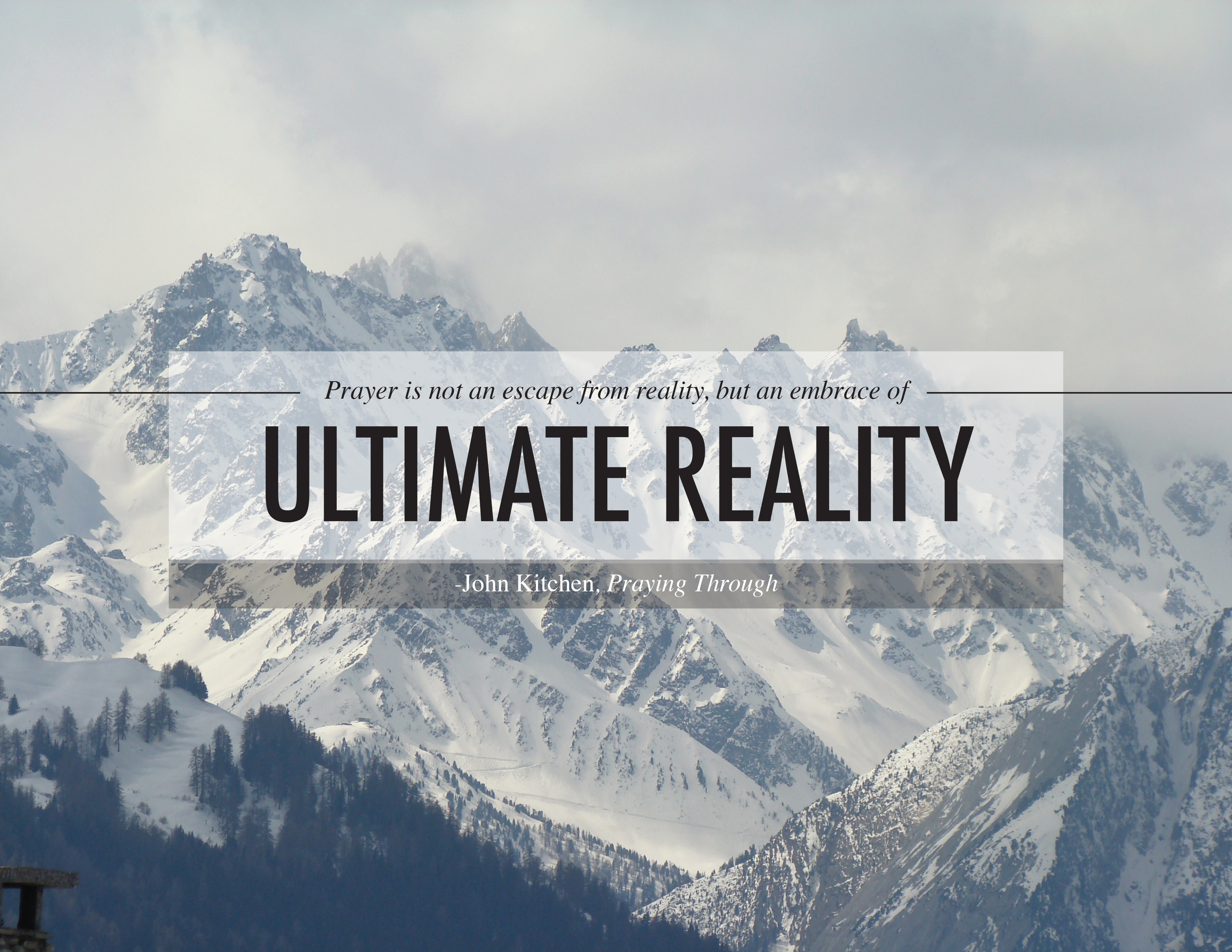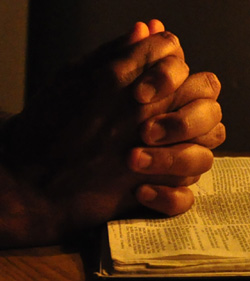Category: Prayer (Page 5 of 7)
Conundrum: “a confusing or difficult problem.”
That’s what prayer often is. There just doesn’t seem to be many straight lines when it comes to prayer. I pray this. That happens. I pray that. This happens. I call; God is quiet. I implore; it seems nothing happens. Every once in a while it seems there comes a direct answer to prayer, just enough encouragement to keep it up, but then the indirect nature of the conversation seems to dominate again.
We’ll never entirely comprehend this prayer conundrum. We possess neither the nature nor the information required for entire understanding.
But there is a hint in Jeremiah’s prophecies that I think may help us. It doesn’t explain everything, but it does explain something … and that something is a significant part of the mystery, I think.
It begins with a promise from God—a prayer-promise. Which puts it in a class of divine promises that at one and the same time raise our expectations about the possibilities and dash our understanding of the actualities.
God offered this to His prophet: “Call to me and I will answer you …” (33:3a). A simple, pointed promise with a seemingly simple, pointed condition. I must call upon God (pray). When I do, God promises: “I will answer you.” But so often that just doesn’t seem to be the way it works out. I call. In the absence of any apparent answer, I call again. And again. And again. And, if nothing appears to correspond to my prayers, well, I probably give up at some point. And I wonder. I wonder about why. I wonder how to understand God’s promise.
God explained to His prophet: “… I have called to them and they have not answered” (35:17b). God has spoken to us (“I have called”). The call expects (and demands!) a response from us. But God can honestly say, “they have not answered.”
So then, God speaks first—otherwise we would not know He was even there, nor would we have any assurance that He would answer if we did make a move toward Him. So, God speaks first. Part of that is seen in His making the promise of prayer. But we simply either did not hear God or we did not heed God. We have disregarded God’s word and then wondered why He has disregarded ours.
This raises for me the possibility that perhaps the first and most fundamental thing I can do when my prayers seem not to be answered is to examine, not my speaking (Have I asked correctly?), but my listening. Am I asking God to grant me a courtesy that I have not afforded to Him? Am I demanding of Him what I am withholding from Him?
In other words: There is a direct line here after all—the direct line between my obedience and the effectiveness of my prayer life. And doesn’t the Bible tell us plainly this is part of the answer to the conundrum?
- The psalmist says, “If I had cherished iniquity in my heart, the Lord would not have listened” (Psalm 66:18).
- The sage teaches us: “If one turns away his ear from hearing the law, even his prayer is an abomination” (Proverbs 28:9).
- The prophet says, “When you spread out your hands, I will hide my eyes from you; even though you make many prayers, I will not listen; your hands are full of blood” (Isaiah 1:15).
- And the apostle adds, “You ask and do not receive, because you ask wrongly, to spend it on your passions” (James 4:3).
This does not mean every prayer of a clean heart is answered just as it is asked. Nor does it mean that every seemingly unanswered prayer is because of sin in my life. But it does find at least one straight line in the conundrum of prayer—a line well worth tracing out: Listening must precede speaking; obedience comes before answer.
Heavenly Father,
Enable me to hear,
Make me to see.
For in the silence
and in the darkness
it is easy to become
disoriented and lost.
I am disoriented
and I feel lost.
Enable me to hear afresh.
Make me to see anew.
In the name of Him who is the Word of God
and who made many blind eyes to see …
Amen.
“I say to the LORD, ‘You are my Lord; I have no good apart from you.’”
(Psalm 16:2)
We all know the story of the elderly couple whose love had grown both old and cold. She complained to him, “Do don’t tell me you love me anymore!” He replied, “I told you that I loved you the day I married you. If I ever change my mind I’ll let you know.”
She didn’t find it very funny.
Frankly, in my experience, women seldom laugh at that story. Men, foolishly, do.
Yet it gets retold again and again—mostly by men who never seem to notice (or maybe just don’t care) that the women are not laughing with them.
David was determined he would not treat the lover of his soul this way. In Psalm 16:2 David tells us what he prays when he bows before the heavenly lover of his soul.
The upper case (capitalized) “LORD” is the English translation’s way of telling us he is using the personal, covenant name of God: Yahweh. The lower case “Lord” is the translators’ rendering of the Hebrew Adonai.
The difference is not unimportant.
Yahweh designates God as the covenant-making, covenant-keeping God. He is the one who pursues us. He seeks us out. He establishes covenant with us—taking upon Himself the obligation of forming and keeping the covenant. He simply invites us into relationship with Himself. That, of course, ultimately and finally found expression through Jesus Christ and His redemptive work at the cross and in His resurrection. God is personal and personally seeks you in love.
Adonai, on the other hand, emphasizes God as “master” or “owner.” He is over us. He rules us. God has authority over us. He has the right to our submission and obedience.
Thus, “I say to the LORD, ‘You are my Lord,” is tantamount to saying “In view of your great redemptive love that sought and bought me for yourself, I gladly bow my entire life to you, I am glad to live under your rule and authority and to curb my life to fulfill your mission and to build your kingdom.”
I say to the lover of my soul, “You are my Owner, Master, and Lord.”
It is sacrificial and pursuing love that makes a life of submissive obedience both possible and delightful. Such love woos our submission and obedience and in so doing transforms it into an expression of our love to Him.
Indeed, David must add, “I have no good apart from you.” I can’t even enjoy life without sharing it with you, Lord! Good just isn’t good unless I can enjoy it in fellowship with you.
Oh great Lover of my soul, thank you for being the initiator, pursuer, and complete provider in our relationship. Thank you for making me your own through Jesus. I bless you for sending your Holy Spirit to make large in my eyes the magnitude of your love. Gladly and with my whole heart I say to you again today, “You are my Lord. Own this life. Rule me in every part. Walk this day with me, making all your good gifts scattered throughout these coming hours a fellowship of joy as we share them together.
At the precise moment that Jesus died “the veil of the temple was torn in two from top to bottom; and the earth shook and the rocks were split” (Matthew 27:51). And thus heaven is opened to us “by a new and living way which He inaugurated for us through the veil, that is, His flesh” (Hebrew 10:20). Now “This hope we have as an anchor of the soul, a hope both sure and steadfast and one which enters within the veil” (Hebrews 6:19).
I recently listened with great blessing to this message by the late Rev. Keith M. Bailey as he unfolded the marvels of the torn veil and an open heaven. I know you’ll be as blessed as I was: The Veil Torn. Heaven Opened.


